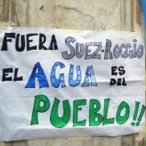
Old News
Concerns over attempts to privatize water in Latin America
Download: MP3 (1.3 Mb)
Several Latin American social movements and organizations have expressed their concerns about the water privatization threats in some countries of the region, for example, Brazil.
There are concrete, and many times subtle, situations in several Latin American countries that indicate that some sectors are trying to leave water outside the control of the state, according to several civil society organizations of the region.
Most natural resources of the planet are located in Latin America and therefore it is important to start mobilizing in order to preserve that wealth, said Brazilian leader Rogerio Hohn to IPS. Hohn is member of the National Coordination of the Movement of Dam-Affected People (MAB). Hohn said that there are many ways in which water privatization can take place. “Even dams for the generation of electric power are a way of privatizing water, because they do not only sell energy, but also the water that is being dammed”, he highlighted.
One of the alternatives promoted by the Latin American social movements and organizations are consultations in the countries for the people to decide how they want their water to be controlled. The plebiscites carried out in Uruguay in October, 2004 and in Italy in June, 2011 are clear examples of this. In both cases, the people rejected the privatization of water.
Meanwhile, in Brazil most sanitation services are provided by the state. The South American country is considered the largest freshwater reservoir in the world, with 11.6 per cent of the total availability in the planet, and 53 per cent of the South American availability, according to an IPS report.
But some aspects of water management in Brazil are concerning social organizations and even the national government. For instance how the private sector is consuming large amounts of water for agricultural and livestock activities.
The coordinator of the National Front for Environmental Sanitation, Edson Aparecido da Silva, said that in Brazil the public sector is in charge of the sanitation services of almost all the population (approximately 190 million inhabitants).
However, representatives of the private sector said that they can extend their participation in sanitation to cover 30 per cent of the inhabitants of the country, said da Silva. This means that “we are constantly living with a threat of further privatization”, he concluded.
Photo: http://ccodav.blogspot.com







